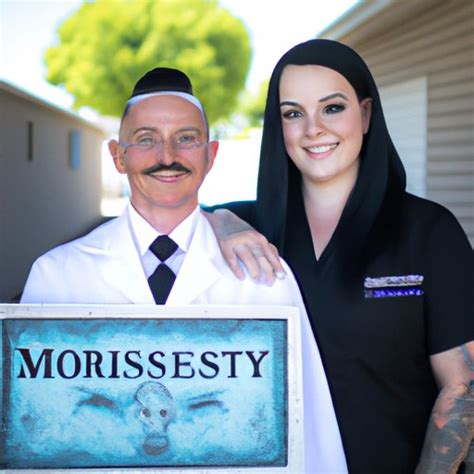Introduction

Mortuary science, also known as funeral service, is a rewarding and challenging career that involves the preparation, preservation, and final disposition of human remains. Individuals who pursue a career in mortuary science play a vital role in providing comfort and support to grieving families while ensuring the deceased are treated with dignity and respect. Illinois offers several accredited mortuary science programs that prepare students for successful careers in this field.
Choosing the Right Program
Selecting the right mortuary science program is crucial for your future success. Consider the following factors when making your decision:
- Accreditation: Ensure the program is accredited by the American Board of Funeral Service Education (ABFSE). Accreditation guarantees the program meets rigorous standards and provides a quality education.
- Curriculum: Review the course offerings to ensure they cover all aspects of mortuary science, including anatomy, pathology, embalming, funeral directing, and grief counseling.
- Experiential Learning: Hands-on experience is essential in mortuary science. Look for programs that offer internships or clinical rotations in funeral homes or crematories.
- Faculty: Consider the qualifications and experience of the faculty. Reputable programs employ professors with industry knowledge and expertise.
- Career Services: Inquire about the program’s career services to assist students with job placement and professional development.
Illinois Mortuary Science Programs
Illinois boasts several accredited mortuary science programs at the following institutions:
| Institution | City | Degree | Accreditation |
|---|---|---|---|
| Midwestern University | Downers Grove | Master of Science in Mortuary Science | ABFSE |
| Worsham College of Mortuary Science | Chicago | Associate of Applied Science in Funeral Service Education | ABFSE |
| Rend Lake College | Ina | Associate of Applied Science in Funeral Service | ABFSE |
| College of DuPage | Glen Ellyn | Associate of Applied Science in Funeral Service Management | ABFSE |
| Southern Illinois University Carbondale | Carbondale | Bachelor of Science in Funeral Service Management | ABFSE |
Career Opportunities
Graduates of Illinois mortuary science programs are highly sought after by funeral homes, crematories, and other related businesses. Career opportunities in this field include:
- Funeral Director
- Embalmer
- Crematory Operator
- Grief Counselor
- Funeral Planner
Salary and Job Outlook
According to the Bureau of Labor Statistics (BLS), the median annual salary for funeral directors was $59,220 in May 2021. The BLS projects that job growth in this field will be 4% over the next decade, faster than the average for all occupations.
Tips and Tricks
- Attend mortuary science conferences and workshops to stay updated on the latest industry trends.
- Join professional organizations, such as the Illinois Funeral Directors Association, to network and gain valuable knowledge.
- Volunteer at funeral homes or crematories to gain practical experience.
- Develop strong communication, interpersonal, and problem-solving skills.
- Be compassionate and empathetic towards grieving families.
Pros and Cons
Pros:
- Rewarding career that provides comfort and support to families in their time of need.
- Stable and high-demand field with excellent job prospects.
- Opportunities for advancement and leadership roles.
- Flexible work schedules and benefits packages.
Cons:
- Can be emotionally challenging, as you will interact with grieving families and deceased individuals.
- Requires extensive training and specialized knowledge.
- May involve working long hours, including weekends and holidays.
FAQs
- Q: What is the difference between a funeral director and an embalmer?
- A: Funeral directors handle the overall planning and coordination of funeral services, while embalmers prepare the deceased for burial or cremation.
- Q: Is there a lot of math involved in mortuary science?
- A: Some math is required, particularly in chemistry and anatomy courses, but most of the curriculum focuses on practical skills and knowledge.
- Q: Can I transfer credits from other programs into a mortuary science program?
- A: Yes, you may be able to transfer credits in courses such as anatomy, physiology, and psychology, but it is important to check with the program you are applying to.
- Q: Are mortuary science programs only for those interested in becoming funeral directors?
- A: No, mortuary science programs also prepare students for careers in grief counseling, funeral home management, and other related fields.
- Q: Is it necessary to have a strong stomach for mortuary science?
- A: While some aspects of the work can be challenging, most students are able to adapt and overcome any initial discomfort.
- Q: How can I find a job in mortuary science?
- A: Contact funeral homes and other related businesses directly, attend job fairs, and utilize online job boards.
Conclusion
Pursuing a mortuary science program in Illinois can open doors to a fulfilling and rewarding career. By carefully considering your options, gaining practical experience, and developing your professional skills, you can become an invaluable asset in the funeral service industry. Remember, the greatest reward in this field is knowing that you have made a positive difference in the lives of grieving families during their most difficult time.
